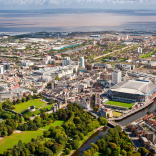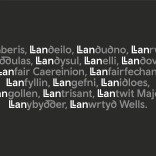Why move to Wales? Ask among those who have come here and you’ll hear many different answers, mostly around work life balance in Wales. But some reasons are likely to crop up time and again...
An enviable lifestyle
Wales is a friendly and cosmopolitan place. Over the centuries, many visitors have put down roots here – not least the Romans, Vikings, Saxons and Normans. Later, as an industrial powerhouse and a seafaring nation, Wales welcomed people from many cultures who made it their home. This has helped to create a modern nation with a strong international outlook and cultural ties to every corner of the world.
It helps to be surrounded by such stunning scenery. A quarter of the Welsh landscape is either a National Park or an Area of Outstanding Natural Beauty, and as such protected by law. It’s a peerless place to immerse yourself in the great outdoors, in any number of ways: biking along forest trails, hiking in the mountains, kayaking on crystal-clear lakes or watching seals and seabirds from the 870-mile Wales Coast Path.


What’s more, living in Wales brings the benefits of a rich and distinctive cultural heritage. It’s impossible not to mention Welsh castles – more, per square mile, than anywhere else on earth – and the relics of Wales' industrial past that are now repurposed in imaginative ways. But although we’re careful to safeguard our history, most notably through Cadw, the Welsh Government’s historic environment service, Wales is no museum. Cymraeg - the Welsh language - might be one of the oldest languages in Europe, but here it is part of everyday life, and spoken by around a fifth of the population.
Wales is known as the land of song, but it’s also a land of theatre, literature, film and every other kind of artistic endeavour. We love live performances and festivals in Wales, and there’s a year-round calendar of cultural events and festivals. Sport in Wales is our other national passion. From fun-runs and grassroots club fixtures to international matches at Cardiff’s Millennium Stadium, it’s a powerful force for bringing people in Wales together.
A low cost of living
In Wales, a good standard of living comes at an affordable cost. The average house price in Wales is around a quarter less than in the UK as a whole, and the average residential rent in Wales is 20% under the UK-wide figure. Likewise, in Wales, family spending on food, travel and entertainment typically works out at 15% less than the UK average.*
Great work opportunities
With a talented workforce, innovative businesses and a culture of entrepreneurship, Wales is a great place to live and work. Wales may have a formidable industrial heritage, but we’re always looking to the future. Wales is fostering the ideas and technologies to drive tomorrow, in fields like renewable energy, compound semiconductors, life sciences, fintech and cyber security. And if you’re self-employed or want to start a business here, you’ll find it simple to access all the business support you need from the Welsh Government.
Our healthcare system
Wales played a vital role in the foundation of the UK’s National Health Service. Its chief architect, Aneurin Bevan, was born in the South Wales mining community of Tredegar, and drew inspiration from its medical-aid societies. Today, healthcare is provided by NHS Wales, through seven local health boards and three all-Wales NHS trusts. They oversee a network of primary-care practices, clinics and hospitals (the biggest of which is the University Hospital of Wales in Cardiff, with over 1,000 beds).
As in the rest of the UK, almost all services are free at the point of delivery. There are no prescription charges in Wales.
A flair for education
An old Welsh proverb is goreu arf, arf dysg: knowledge is the best weapon. Education is valued in Wales, beginning with the local schools found at the heart of every community. They teach a curriculum that’s distinct from the rest of the UK, though Welsh qualifications are equivalent to those in England and respected around the world. Every pupil has the opportunity to learn Welsh. Some schools teach bilingually, or deliver lessons entirely through the Welsh language.
Children between the ages of three and 18 are entitled to state-funded nursery, primary and secondary education. At 16, there’s the option of enrolling in one of the 15 further education colleges in Wales as an alternative to school. These offer a wide range of academic, professional and vocational courses, and clear progression routes into higher education. They also maintain close links with employers across many industry sectors.
Wales has eight universities. They’re located throughout the country, from Cardiff in the south to Aberystwyth on the west coast and Bangor in the north. Our student population numbers more than 136,000, and they’re enrolled in a vast range of undergraduate and postgraduate courses, from Architecture to Zoology. Welsh universities have an outward-looking ethos, with more than 170 nationalities represented, and often appear near the top of UK league tables for academic excellence and student satisfaction.
Study in Wales have some great resources for prospective students, including travel tips and packing essentials for overseas students, and advice for new students on settling in to Wales.
A place for everyone
For a small nation, Wales packs in a phenomenal amount of variety. Is your preference for city lights or dark, star-speckled skies – and would you rather wake up to lapping waves, or an amphitheatre of mist-covered mountains? Wherever you settle, Wales’ size and good transport links mean that you’ll be within easy reach of all these different scenes.
Visit Wales splits the country into four regions. North Wales, which includes the island of Anglesey, is justly described as an epic landscape. It’s known for the mountains of Snowdonia, mighty castles, and the university cities of Bangor and Wrexham. West Wales has the beautiful Pembrokeshire Coast National Park, a good deal of the nation’s most celebrated beaches, and Swansea, our second city on the cusp of the Gower Peninsula.
South Wales is home to the Welsh capital, Cardiff – a creative, cultural and sporting hub – and the city of Newport. The towns of the South Wales Valleys, once teeming with heavy industry, can now be appreciated for their spectacular setting, and it’s difficult not to fall in love with the splendour of the Wye Valley. Finally, there’s Mid Wales. The nation’s green heartland is wild and unspoilt, with rivers rising in the mountain ranges, fine old market towns and Victorian spa resorts, and the rugged beauty of the Ceredigion coast.
*Figures correct as of January 2023




